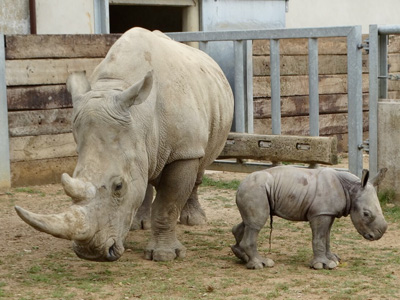Second baby rhino born at Cotswold Wildlife Park this year!

Cotswold Wildlife Park delighted at surprise arrival of second Rhino calf in one year.
On Tuesday 18 August, at around 7pm, Cotswold Wildlife Park had a rather unexpected arrival. White Rhino Nancy gave birth to her second calf. Keepers knew Nancy was pregnant, but the actual birth came as a bit of a surprise and a little earlier than expected.
Births in captivity are considered extremely rare, with only fourteen White Rhinos being born in European zoos in the last twelve months. Cotswold Wildlife Park was responsible for two out of the three recorded UK births. The new addition is the sixth member to join the ‘crash’ (the collective noun for a group of Rhinos).
Curator Jamie Craig commented: “After almost forty years of desperately trying to breed from our old group of Rhinos with no success, we are delighted to now have had three calves since 2013. The newest member of the crash was somewhat more of a surprise than we’d like, but at present, all seems to be going well.”
It’s been a remarkable few years for the Rhino family. In 2013, first-time parents Monty and Nancy delighted staff and visitors when they produced the first calf in the Park’s forty-three year history - a female named Astrid. Two years later, she has been joined by a baby brother, who is yet to be named. To add to the celebrations, earlier this year, another of the Park’s breeding females, Ruby, gave birth to a male calf, named Ian.
White Rhinos (Ceratotherium simum ssp. simum) have always been an important species at the Wildlife Park, which was founded by Mr John Heyworth in 1970. His son Reggie Heyworth, Managing Director of Cotswold Wildlife Park, commented: “You wait forty years, then it seems like three come along at once! This is such a happy event for the Park, and I have to pinch myself when I see six rhinos on the lawn.”
Females only reproduce every two-and-a-half to five years, so the window of opportunity for successful reproduction is limited. After a gestation period of sixteen to eighteen months, a single calf is born. Nancy is proving, once again, to be an excellent and very protective mother. A newborn calf will stand up within one hour of birth and immediately attempt to suckle, although may be a little unsteady on his feet for the first few days. He will remain under the watchful eye of his mother, suckling from her for approximately one year. Their bond is an intensely strong one and the calf will remain with his mother for at least two years, benefiting from her protection. Females guard their offspring aggressively and are intimidating adversaries if challenged.
Unbelievably, these iconic animals were once the rarest subspecies of any Rhino and were on the verge of extinction in the early 1900s, when it was believed only twenty to fifty animals remained in their native African homeland. Thanks to excellent and sustained protection, they are now the most common of the five Rhino subspecies, although poaching in the last five years has once again escalated to serious levels, driven by demand for rhino horn from the traditional medicine market of China and the Far East.
Visitors can see the new calf daily from 10am to 6pm (last entry at 4.30pm) in the large Rhino paddock and solar powered Rhino House.
Additional information
- Monty and Nancy are both nine years old.
- In 2009, Nancy (along with Ruby) made the eleven thousand kilometre journey from Mafunyane Game Farm in South Africa to the UK to join young male Monty.
- Shortly after her arrival, Prime Minister and local MP David Cameron visited the Park and named the new female Rhino Nancy (after his daughter). Mr Cameron still visits the Wildlife Park with his family.
- Cotswold Wildlife Park is committed to Rhino conservation and works closely with Tusk Trust to promote vital conservation work. Find out more at www.cotswoldwildlifepark.co.uk/conservation and www.tusk.org.
- White Rhinos are the largest of the five Rhino species and range throughout the grassland of Southern Africa.
- In 2012, a team of European palaeontologists discovered a nine-million-year old Rhinoceros skull in a remarkable state of preservation, embedded in volcanic rock at Cappadocia, Central Turkey.
Cotswold Wildlife Park opens its doors at 10am every day, with last admission at 4.30pm.
Explore Gloucestershire
26 August 2015
For further information.
OTHER NEWS
